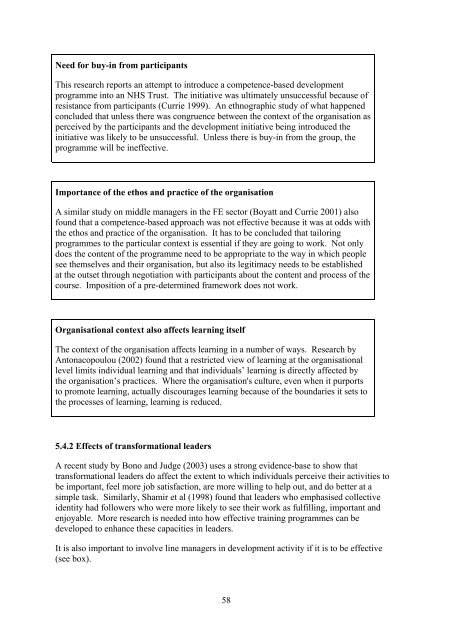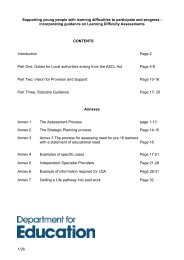The Development of Management and Leadership Capability and its ...
The Development of Management and Leadership Capability and its ...
The Development of Management and Leadership Capability and its ...
Create successful ePaper yourself
Turn your PDF publications into a flip-book with our unique Google optimized e-Paper software.
Need for buy-in from participants<br />
This research reports an attempt to introduce a competence-based development<br />
programme into an NHS Trust. <strong>The</strong> initiative was ultimately unsuccessful because <strong>of</strong><br />
resistance from participants (Currie 1999). An ethnographic study <strong>of</strong> what happened<br />
concluded that unless there was congruence between the context <strong>of</strong> the organisation as<br />
perceived by the participants <strong>and</strong> the development initiative being introduced the<br />
initiative was likely to be unsuccessful. Unless there is buy-in from the group, the<br />
programme will be ineffective.<br />
Importance <strong>of</strong> the ethos <strong>and</strong> practice <strong>of</strong> the organisation<br />
A similar study on middle managers in the FE sector (Boyatt <strong>and</strong> Currie 2001) also<br />
found that a competence-based approach was not effective because it was at odds with<br />
the ethos <strong>and</strong> practice <strong>of</strong> the organisation. It has to be concluded that tailoring<br />
programmes to the particular context is essential if they are going to work. Not only<br />
does the content <strong>of</strong> the programme need to be appropriate to the way in which people<br />
see themselves <strong>and</strong> their organisation, but also <strong>its</strong> legitimacy needs to be established<br />
at the outset through negotiation with participants about the content <strong>and</strong> process <strong>of</strong> the<br />
course. Imposition <strong>of</strong> a pre-determined framework does not work.<br />
Organisational context also affects learning <strong>its</strong>elf<br />
<strong>The</strong> context <strong>of</strong> the organisation affects learning in a number <strong>of</strong> ways. Research by<br />
Antonacopoulou (2002) found that a restricted view <strong>of</strong> learning at the organisational<br />
level lim<strong>its</strong> individual learning <strong>and</strong> that individuals’ learning is directly affected by<br />
the organisation’s practices. Where the organisation's culture, even when it purports<br />
to promote learning, actually discourages learning because <strong>of</strong> the boundaries it sets to<br />
the processes <strong>of</strong> learning, learning is reduced.<br />
5.4.2 Effects <strong>of</strong> transformational leaders<br />
A recent study by Bono <strong>and</strong> Judge (2003) uses a strong evidence-base to show that<br />
transformational leaders do affect the extent to which individuals perceive their activities to<br />
be important, feel more job satisfaction, are more willing to help out, <strong>and</strong> do better at a<br />
simple task. Similarly, Shamir et al (1998) found that leaders who emphasised collective<br />
identity had followers who were more likely to see their work as fulfilling, important <strong>and</strong><br />
enjoyable. More research is needed into how effective training programmes can be<br />
developed to enhance these capacities in leaders.<br />
It is also important to involve line managers in development activity if it is to be effective<br />
(see box).<br />
58
















